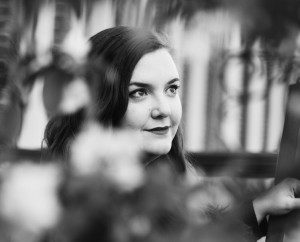 Born in Lisbon, Sofia’s earlier singing studies started in the voice class of Joana Levy, which she concluded with a maximum classification. She currently studies with Xenia Meijer, in the Early Music Master program of the Conservatory of Amsterdam. She graduated her bachelor degree in Classical Singing in the same institution, in the class of Sasja Hunnego. She was a finalist of the 9th Classical Singing competition of the Rotary Club Foundation, in Portugal, in 2016. In 2017 she was invited as a soloist to perform at the Abu Gosh festival and in solo recitals in Tel Aviv, Jerusalem and Haifa (Israel). Sofia is a founding member of Ensemble Seconda Prat!ca. With this group, she has performed in the Festival d’Ambronay and Festival du Sablé (France), Sevicq Brezice (Slovenia), Oude Muziek Festival (The Netherlands), Internationale Händel-Feestspiele Göttingen and Heinrich Schütz Musikfest (Germany), Stockholm Early Music Festival (Sweden) and in Japan, Latvia and Portugal. The ensemble’s first recording, “Nova Europa”, was released in 2016 by Ambronay Éditions. She also recorded in Jonatan Alvarado’s CD “Pajarillos Fugitivos”, with the Ayros recording label, launched in 2018. She has attended masterclasses of Dame Emma Kirkby, Isabel Rey, Claron McFadden, Ira Siff, Alexander Oliver, John Potter and Elena Dumitrescu Nentwig.
Born in Lisbon, Sofia’s earlier singing studies started in the voice class of Joana Levy, which she concluded with a maximum classification. She currently studies with Xenia Meijer, in the Early Music Master program of the Conservatory of Amsterdam. She graduated her bachelor degree in Classical Singing in the same institution, in the class of Sasja Hunnego. She was a finalist of the 9th Classical Singing competition of the Rotary Club Foundation, in Portugal, in 2016. In 2017 she was invited as a soloist to perform at the Abu Gosh festival and in solo recitals in Tel Aviv, Jerusalem and Haifa (Israel). Sofia is a founding member of Ensemble Seconda Prat!ca. With this group, she has performed in the Festival d’Ambronay and Festival du Sablé (France), Sevicq Brezice (Slovenia), Oude Muziek Festival (The Netherlands), Internationale Händel-Feestspiele Göttingen and Heinrich Schütz Musikfest (Germany), Stockholm Early Music Festival (Sweden) and in Japan, Latvia and Portugal. The ensemble’s first recording, “Nova Europa”, was released in 2016 by Ambronay Éditions. She also recorded in Jonatan Alvarado’s CD “Pajarillos Fugitivos”, with the Ayros recording label, launched in 2018. She has attended masterclasses of Dame Emma Kirkby, Isabel Rey, Claron McFadden, Ira Siff, Alexander Oliver, John Potter and Elena Dumitrescu Nentwig.
Sofia has performed the following roles for staged operas in her previous schools: Santuzza in Cavalleria Rusticana (Mascagni), Suor Genovieffa in Suor Angelica(Puccini), Servilia in La Clemenza di Tito (Mozart), Carmen in Carmen (Bizet), Belinda and 2nd Woman in Dido and Aeneas (Purcell), Bruxa/Witch in Hänsel und Gretel (Humperdinck), Maman and Libellule in L’Enfant et les Sortilèges (Ravel), and Eurydice in Orphée et Eurydice (Gluck). In 2017, Sofia sang the role of Spirit in Cendrillon (Massenet) with the Dutch National Opera Academy; with ensemble Seconda Prat!ca, she performed in the opera Fairy Queen (Purcell) at the Festival Travelling in Baroque. She has performed as a soloist in Requiem (Mozart), Kaiserrequiem (Fux), Petite Messe Solennelle (Rossini), Messiah (Händel), Gloria (Vivaldi), Magnificat em Talha Dourada (Eurico Carrapatoso) and Missa Crioula (Ariel Ramirez). Sofia holds a bachelor degree in Archaeology, from Universidade Nova de Lisboa.
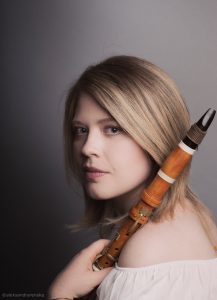
Giulia Zannin is an Italian clarinetist with international experience performing on both modern and historical clarinets. She finished her post-graduate studies in historically informed performance on period instruments under the guidance of Ernst Schlader at the Staatliche Hochschule für Musik in Trossingen and Eric Hoeprich at the Royal Conservatory in The Hague, and collaborates with the following ensembles: De Nederlandse Bachvereniging, Le Cercle de l’Harmonie, Irish Baroque Orchestra, Koelner Akademie, Warsaw Chamber Opera, Nieuwe Philharmonie Utrecht, Bremer Baroqueorchester, Orchestra Lorenzo da Ponte, Symphonie Atlantique and the Mannheimer Hofkapelle Baroqueorchester. As a chalumeau player she collaborated for an album of unpublished music by Christopher Graupner under the CPO label (Das Leiden Jesu, Passion Cantatas) and performed for the acclaimed Dutch première of “Il Sacrifizio di Abramo” by Camilla de Rossi with De Nederlandse Bachvereniging at the Concertgebouw in Amsterdam. In 2011, she made her solo debut with Mozart’s Clarinet Concerto accompanied by the Orchestra della Svizzera Italiana. Soon after, she began working with European orchestras such as Hulencourt Soloists Chamber Orchestra, Haydn Orchestra of Bolzano and Trento, Spira Mirabilis, Schweizer Jugend Sinfonie-Orchester, Orchester der Bayerischen Philharmonie München and Aurora Chamber Orchestra. In 2013, Giulia was awarded a scholarship from the DAAD (German Academic Exchange Service) allowing her to move to Germany. Here, under the guidance of Chen Halevi, she explored the clarinet’s contemporary repertoire, finishing in 2015 with a Master of Chamber Music at the Staatliche Hochschule für Musik in Trossingen. She performed in several festivals collaborating with ensembles of international standing in the field of contemporary music such as Klangforum Wien, Ensemble Modern Frankfurt, L’Instant Donné, and Donaueschingen Off. As the Founder of the Ensemble La Favorita, she aims to discover new sonorities and offer the audience lesser known repertoire from the 18th century. Awarded in three national competitions for young musicians, she has been supported in her academic studies from scholarships offered by the following foundations: Schweizerische Interpreten-Gesellschaft, Fritz-Gerber-Stiftung für junge begabte Menschen, Erasmus Program and DAAD. Giulia is teaching Historical Clarinet and Chalumeau at the Accademia di Musica Antica of Feltre and plays on chalumeaux made by Agnes Guéroult in Paris.
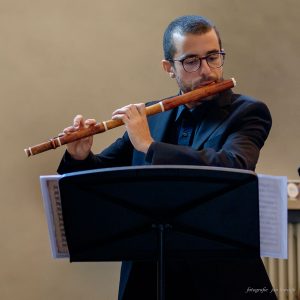
Tiziano Teodori graduated in modern flute at the Conservatory of Music “Alfredo Casella” of L ‘Aquila with Luigi Tufano, with whom he completed his two-year Masters in Chamber Music with a thesis on “Bach and the 1-key flute”. At the same time, he finished his studies of Phony at the “Roberto Rossellini Institute for Cinematography ” in Rome. He gives concerts in Italy and in the Netherlands where he is currently a student of traverso at the Royal Conservatoire of The Hague with Wilbert Hazelzet and Kate Clark. He has collaborated with the Baroque Orchestra Orion Bach Ensemble as first flute; with the Ensemble Les Petits Riens at the Reinken Early Music Festival and with the Ensemble Seraphim at the “Renaissance Sounds Young”, as soloist and as student with the Orchestra of the 18th Century. On modern flute, projects are born from previous collaborations with other musicians: “Pollution” with guitarist Andrea Cauduro with whom he produced the album “Blu Pollution”; “Zoutman Winds” with oboist Federico Forla with whom he participated in the festival “Fete de la Music” in Geneva; and “Amniotic Gap” with Ruben Brovida, Stefano Sgarbi with whom he played at “Bizarre Festival” in Rotterdam. During the years, Tiziano has participated at many masterclasses with distinguished masters such as Frank Theuns, Olivier Schneebeli, Anne Smith, Andrea Oliva, and Luigi Tufano.
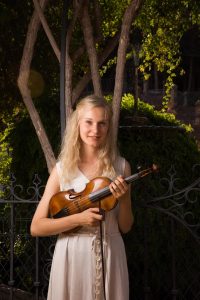 Lena Rademann is an accomplished baroque violin and viola player with a lively passion for chamber music. She studied at the Royal Conservatoire of The Hague with Enrico Gatti and Kati Debretzeni. Upon graduation, she moved to Basel, where she currently studies with Leila Schayegh in the Master of Performance program at the Schola Cantorum Basiliensis. Lena has been a participant of international orchestral projects such as the Hofmusikakademie of the SWR-Festspiele, EUBO, JSB Ensemble, OFJ Baroque and Academia Montis Regalis. She has engaged with inspiring musical perspectives through various masterclasses, including Nadja Zwiener, Mechthild Karkow, and Stephanie Paulet, among others. Lena has performed in international festivals as a member of various chamber music ensembles, including the Festival Oude Muziek Utrecht Fabulous Fringe, the Musica Antiqua Brugge Fringe, the ECOS Festival, and the International Young Artist Presentation in Antwerp. In ensemble competitions, several of her groups have been awarded with prizes, such as the 3rd prize in Concorso Maurizio Pratola (Aroma Quartett), the Gebrüder Graun Preis (DNMO chamber ensemble) and the Sonderpreis des BR Klassik in Deutscher Musikwettbewerb 2019 (Amaconsort). Her ensemble Amaconsort won the Audience Award of Festival Oude Muziek Utrecht Fringe and was selected for the residence Rheinsberger Hofkapelle.
Lena Rademann is an accomplished baroque violin and viola player with a lively passion for chamber music. She studied at the Royal Conservatoire of The Hague with Enrico Gatti and Kati Debretzeni. Upon graduation, she moved to Basel, where she currently studies with Leila Schayegh in the Master of Performance program at the Schola Cantorum Basiliensis. Lena has been a participant of international orchestral projects such as the Hofmusikakademie of the SWR-Festspiele, EUBO, JSB Ensemble, OFJ Baroque and Academia Montis Regalis. She has engaged with inspiring musical perspectives through various masterclasses, including Nadja Zwiener, Mechthild Karkow, and Stephanie Paulet, among others. Lena has performed in international festivals as a member of various chamber music ensembles, including the Festival Oude Muziek Utrecht Fabulous Fringe, the Musica Antiqua Brugge Fringe, the ECOS Festival, and the International Young Artist Presentation in Antwerp. In ensemble competitions, several of her groups have been awarded with prizes, such as the 3rd prize in Concorso Maurizio Pratola (Aroma Quartett), the Gebrüder Graun Preis (DNMO chamber ensemble) and the Sonderpreis des BR Klassik in Deutscher Musikwettbewerb 2019 (Amaconsort). Her ensemble Amaconsort won the Audience Award of Festival Oude Muziek Utrecht Fringe and was selected for the residence Rheinsberger Hofkapelle.
Lena is a Deutscher Akademischer Austauschdienst (DAAD) scholarship holder.
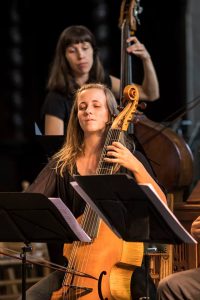
Anna Lachegyi was born in Hungary and started to play the cello at the age of five. She received her degree in performance on cello at the Debrecen Academy of Music in 2012, where she studied in the class of Ditta Rohmann.She began her viola da gamba studies with Sándor Szászvárosi six years ago and since then she has taken part in several festivals in Europe such as Utrecht Early Music Festival (Netherlands), Femas Early Music Festival of Sevilla (Spain), Early Music Festival of Csíkszereda (Romania), Börzsöny Barokk Days (Hungary) or Szalone Dni Musyki (Poland). In 2017 she won second and third prizes with her ensembles in the La Stravaganza early music competition in Romania. She is a student of Mieneke van der Velden and Philippe Pierlot at the Royal Conservatory of The Hague where she plays baroque cello as well in the class of Caroline Kang.
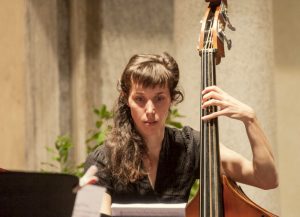 Eva Euwe studies historical double bass and violone with Margaret Urquhart at the Royal Conservatoire in The Hague. She received her Bachelor diploma from the Utrecht Conservatory, where she studied modern double bass with Quirijn van Regteren Altena and historical double bass bass/violone with Joshua Cheatham. Eva has a passion for historically informed performance practices and ensemble playing, but she also loves the modern and contemporary repertoire and tries to combine these careers. She works as a freelance bassist with several ensembles and regularly performs with top HIP musicians in Holland. During her bachelor studies, she received wonderful masterclasses from, among others, Carol Harte and James Oesi. In 2015, she participated the NJO, conducted by Xian Zhang. The modern double bass she plays is built by Harry Jansen and borrowed from the Dutch Musical Instrument Foundation. For her work in the historical field, Eva uses a Mittenwalder double bass from 1890 and several bows that are copies of original bows from the baroque and classical era.
Eva Euwe studies historical double bass and violone with Margaret Urquhart at the Royal Conservatoire in The Hague. She received her Bachelor diploma from the Utrecht Conservatory, where she studied modern double bass with Quirijn van Regteren Altena and historical double bass bass/violone with Joshua Cheatham. Eva has a passion for historically informed performance practices and ensemble playing, but she also loves the modern and contemporary repertoire and tries to combine these careers. She works as a freelance bassist with several ensembles and regularly performs with top HIP musicians in Holland. During her bachelor studies, she received wonderful masterclasses from, among others, Carol Harte and James Oesi. In 2015, she participated the NJO, conducted by Xian Zhang. The modern double bass she plays is built by Harry Jansen and borrowed from the Dutch Musical Instrument Foundation. For her work in the historical field, Eva uses a Mittenwalder double bass from 1890 and several bows that are copies of original bows from the baroque and classical era.
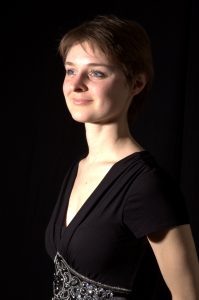
Henriëtte Wirth studied piano at the Conservatory of Utrecht, harpsichord at the Royal Conservatory of Brussels, fortepiano at the Royal Conservatory of The Hague and musicology at the Utrecht University. She wrote a research article at Utrecht University about Janny van Wering, the first professional Dutch harpsichord player in the Netherlands. Henriëtte performs regularly as a soloïst as well as a chamber music player. In 2009 she founded the Arcadie Trio together with clarinettist Steven Geraads and cellist Timothée Busch. Between 2014 and 2019 she was artistic leader of the baroque orchestra Ars Mirabilis. Henriëtte is also the harpsichordist of the early music ensemble La Favorita. Besides playing keyboard instruments, she plays baroque harp in L’Olivastro, an ensemble which focusses on Italian music from the beginning of the 17th century. And together with tenor Pablo Gregorian, she forms a duo in which she plays piano and baroque harp.
Henriëtte has more than 15 years of teaching experience in piano and harpsichord for both children and adults and teaches in her Pianoles Culemborg, which opened in 2021.